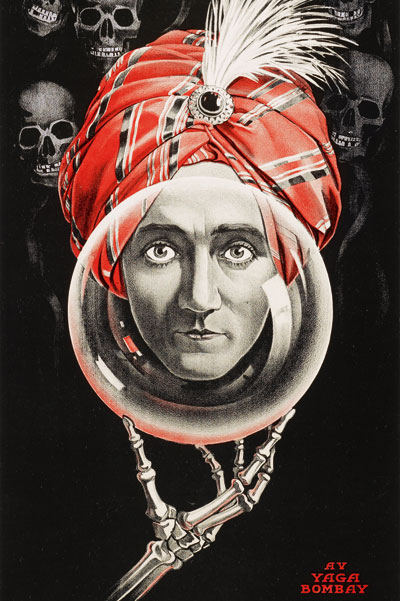People, they say, want different things from a book over the summer than they do the rest of the year. If, by chance, you are looking for a book that will both give you a hernia and teach you how to make a bridge disappear, this could be just the thing for you.
The motorbike messenger who delivered my copy of Magic had to come in for a glass of water and complained that the effort of carrying it had made his legs bowed. It is, quite simply, the largest book I have ever tried to read — the literary equivalent of the Great Bed of Ware.
So what’s inside it? An awful lot of pictures, beautifully reproduced, interspersed with essays on the history of magic. Handily, these come in English, French and German, in case you want to get some European pals round for a simultaneous reading — there’s plenty of room for everyone.
Magic, not altogether surprisingly, took off as a public spectacle during the Age of Reason, when the desire to believe in the inexplicable underwent a sudden, indirect, surge. For a long time, China was held to be the source of the most powerful magic — it being very far away and full of famously inscrutable people. By the end of the 19th century, the theatres of London, Paris and New York were full of magicians with shaved heads and droopy moustaches and names like Fu Manchu.
Many, like Fu Manchu himself — real name David Bamberg — had never been further east than Barking, and therefore had to keep their stage patter to a minimum. One man, Ching Ling Soo (aka William Robinson) only ever spoke on stage once. This was when his famous Bullet Catching Trick went horribly wrong and he was shot through the heart. The audience, assuming Ching’s death agonies were part of his act, were astonished to hear him shriek, in perfect English, ‘Oh my God, something’s happened! Lower the curtain!’
The French magician, Jean Eugene Robert-Houdin — who Houdini named himself after — became such a national figure that in 1856 the French government begged him to come out of retirement to help quell a rebellion in Algeria. The rebellion was led by a group of Muslims called the Marabouts, and the French believed that if Houdin’s magic could be shown to be more powerful than the Marabouts’ proclaimed supernatural powers, their rebellion would fizzle out in ignominy.
In a tent in the desert, Houdin performed his Light and Heavy Chest Trick, which involved placing a wooden chest with a metal plate in the bottom above an
electromagnet. As soon as the current was turned on, the box became impossible to lift. The brawniest Marabout grasped the box’s metal handles and huffed and puffed futilely away — to the astonishment of his colleagues. For good measure, Houdin then re-directed the electrical current through the handles, prompting the Marabout to let loose an agonised scream and run from the tent. Sure enough, they never troubled the French again.
Karl the Necromancer, Hermann the Great, Carter the Mysterious, Bancroft the Magician… They all pass through these pages with their pointy beards and their swirling capes. But my favourite story here isn’t about magic at all — although it does give a vivid flavour of the atmosphere in 19th-century beer halls where many stage magicians plied their craft.
One evening in the 1890s the manager of a beer hall in New York stepped on stage and announced, ‘Now, gentlemen, Miss Lillian Dinkins will sing Love Among the Roses.’ ‘She’s a whore!’, shouted a drunk in the audience. Without missing a beat, the manager continued, ‘Nevertheless, Miss Dinkins will sing Love Among the Roses.’






Comments